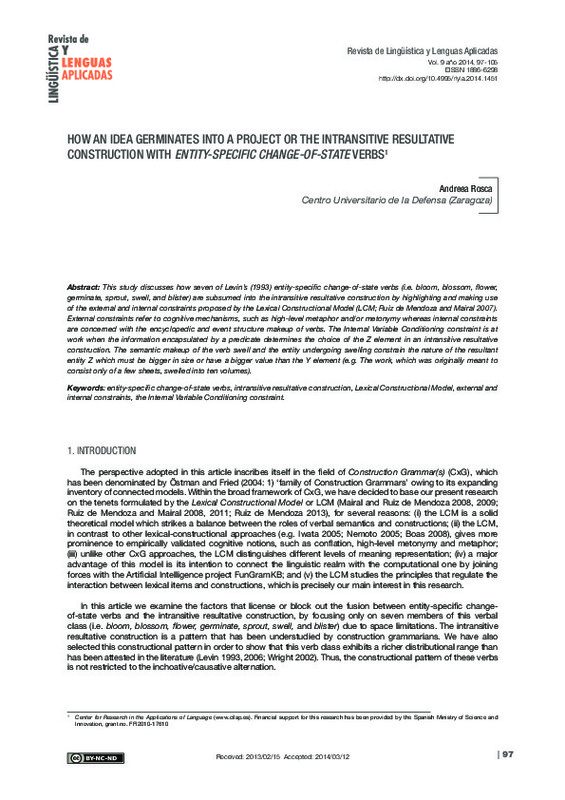Broccias, C. (2004). The cognitive basis of adjectival and adverbial resultative constructions. Annual Review of Cognitive Linguistics, 2, 103-126. doi:10.1075/arcl.2.04bro
Fodor, J. A. (1970). "Three Reasons for Not Deriving Kill from Cause to Die". Linguistic Inquiry 1, 429-438.
Goldberg, A. (1991). "It can't go down the chimney up: Paths and the English Resultative", in L. A. Sutton, C. Johnson and R. Shields (eds.) Proceedings of the seventeeth annual meeting of the Berkeley Linguistics Society. Berkeley, California: Berkeley Linguistics Society, 368-378.
[+]
Broccias, C. (2004). The cognitive basis of adjectival and adverbial resultative constructions. Annual Review of Cognitive Linguistics, 2, 103-126. doi:10.1075/arcl.2.04bro
Fodor, J. A. (1970). "Three Reasons for Not Deriving Kill from Cause to Die". Linguistic Inquiry 1, 429-438.
Goldberg, A. (1991). "It can't go down the chimney up: Paths and the English Resultative", in L. A. Sutton, C. Johnson and R. Shields (eds.) Proceedings of the seventeeth annual meeting of the Berkeley Linguistics Society. Berkeley, California: Berkeley Linguistics Society, 368-378.
Goldberg, A. (2006). Constructions at work: the nature of generalization in language. New York: Oxford University Press.
Lakoff, G. and M. Johnson (1980). Metaphors We Live By. Chicago: The University of Chicago Press.
Levin, B. (1993). English Verb Classes and Alternations. A Preliminary Investigation. Chicago and London: University of Chicago Press.
Mairal, R. and F. J. Ruiz de Mendoza (2008). "New challenges for lexical representation within the Lexical-Constructional Model". Revista Canaria de Estudios Ingleses 57, 137-158.
Ruiz de Mendoza, F. J. (2008). "Cross-linguistic analysis, second language teaching and cognitive semantics: the case of Spanish diminutives and reflexive constructions", in S. De Knop and T. De Rycker (eds.) Cognitive Approaches to Pedagogical Grammar. Berlin and New York: Mouton de Gruyter, 121-152.
Ruiz de Mendoza, F. J. and A. Luzondo (2013). "Lexical-constructional subsumption in resultative constructions in English", in M. Brdar, M. Zic, I. Raffaelli, M.-M. Stanojevic and N. Tudjman Vukovic (eds.) Cognitive Linguistics. Between Universality and Variation. Cambridge Scholars Publishing; vol. in prep.
Ruiz de Mendoza, F. J. and R. Mairal (2011). "Constraints on syntactic alternation: lexical-constructional subsumption in the Lexical-Constructional Model", in P. Guerrero (ed.) Morphosyntactic Alternations in English. Functional and Cognitive Perspectives. London, UK/Oakville, CT: Equinox, 62-82.
Ruiz de Mendoza, F. J. and R. Mairal (2008). "Levels of description and constraining factors in meaning construction: An introduction to the Lexical Constructional Model". Folia Linguistica 42(2), 355-400.
Ruiz de Mendoza, F. J. and F. Santibá-ez (2003). "Content and formal cognitive operations in construing meaning". Italian Journal of Linguistics 15, 293-320.
Wright, S. K. (2002). "Transitivity and Change of State Verbs", in J. Larson and M. Paster (eds.) Proceedings of the twenty-eighth annual meeting of the Berkeley Linguistics Society. Berkeley, California: Berkeley Linguistics Society, 339-350.
[-]








